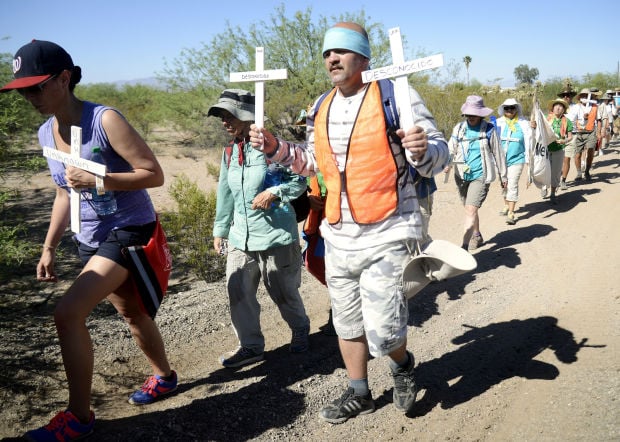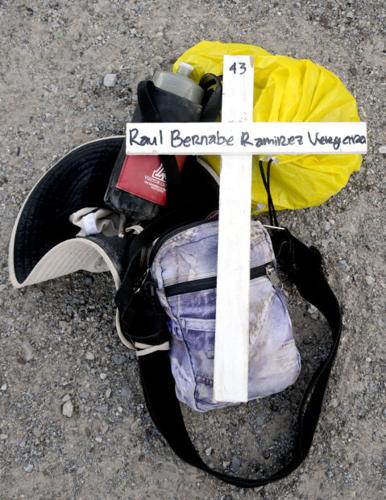Supporters cheered and took pictures as the group of more than 50 participants in the Migrant Trail Walk filed into Kennedy Park Sunday morning, but the mood among the walkers was somber.
They had one last thing to do before they could celebrate the end of their 75-mile journey.
One by one, they laid down the white crosses they had been carrying . Some of them bore the names of migrants who had died in the desert and been identified, but the majority were labeled “Desconocido” — unknown — for the hundreds of anonymous dead.
More than 2,200 border crosser remains have been found in Southern Arizona since 2001. In the last three fiscal years alone, Border Patrol has recorded more than 1,200 deaths in the Southwest.
“An immigration system that at one time gave opportunities to migrants for a better future has become a silent killer along our border,” said Saulo Padilla, a Guatemalan immigrant with the Mennonite Central Committee in Indiana. “This walk, step by step, has been a call to the conscience of each one of us.”
Now in its 11th year, the Migrant Trail Walk sees participants from throughout the world cover the 75 miles in a seven-day trek beginning in Sasabe, Sonora, and ending in Tucson. Participants walk more than 10 miles each day, holding crosses and periodically calling out the names of the dead to memorialize their passing.
Walkers seek to call attention to what they call a human-rights crisis taking place along the border.
“We are all walking with grief and walking with hope,” said Chris Amoroso, a retired physician from Green Valley. “One foot is lamenting the senseless loss of lives and then the next step is moving forward with hope, liberating the spirit of those who can no longer speak.”
Amoroso, 80, the oldest member of the group who participated in his fourth walk, said the reason he marches has changed over the years.
“I walk for the same reasons as others, the hopes for no more deaths and changes in policy, but I’ve added to that to walk because I can,” he said. “At my age I’m just delighted that I can still walk, so I walk for my friends and my peers, who would do it in a heartbeat if they had the capability.”
For Natividad Cano, a native of Sasabe, Sonora, who took part in her second walk, the trip through the desert was deeply moving. She said they all picked up the spirits of those who have died, with hers being of the man whose name was on the cross she was carrying, Victor Hugo Riebeling-Duarte.
The 45-year-old man’s remains were found May 23, 2013, with his probable cause of death listed as hyperthermia from extreme heat by the Pima County Medical Examiner’s Office. In Riebeling-Duarte, Cano saw the hopes of all immigrants and the reason why she and fellow walkers braved the arduous trail.
“He crossed the desert out of necessity. Maybe he needed to feed his family, maybe he needed medicine for his elderly parents, maybe he came searching for his sons or brothers,” she said. “Something motivated him to cross that dangerous desert – now I have completed his walk.”





